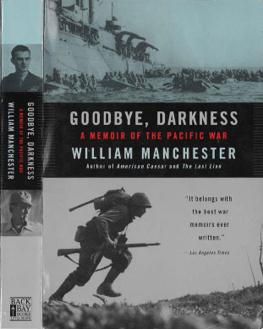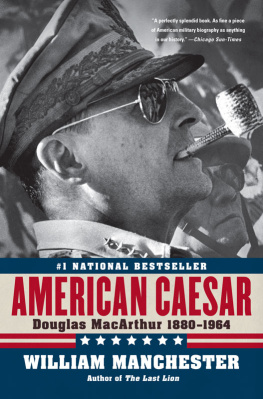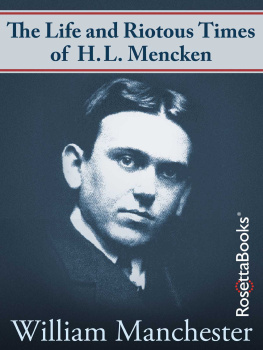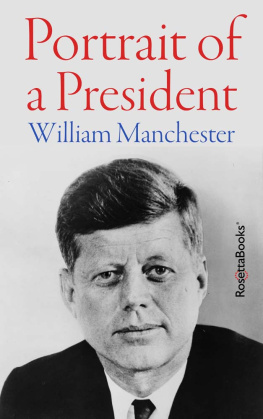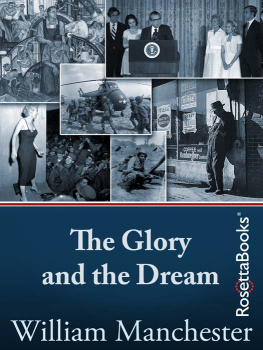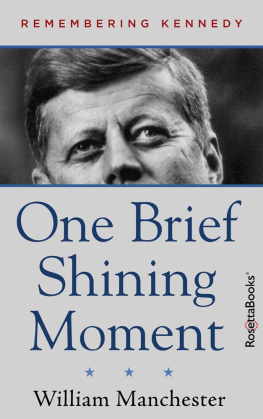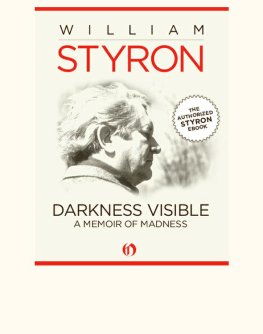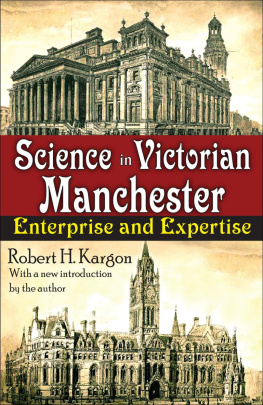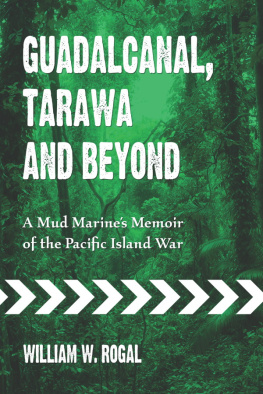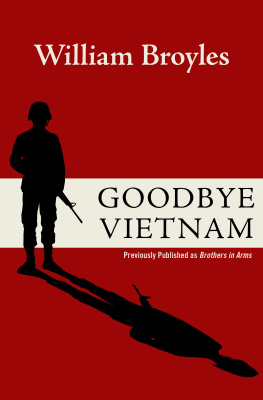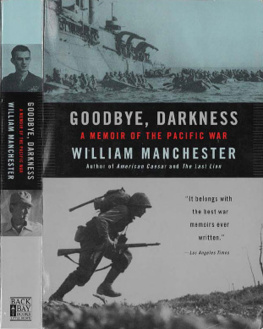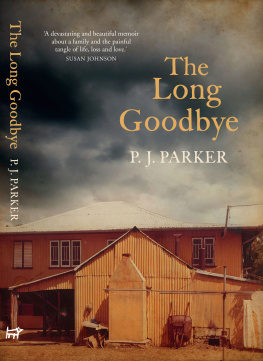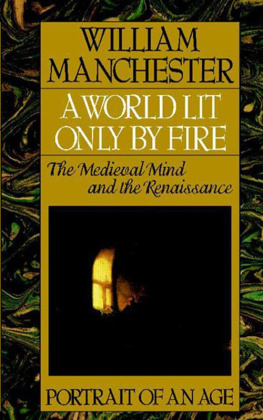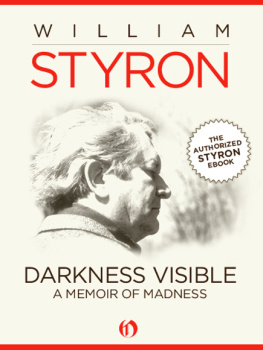William Manchester - Goodbye, Darkness: A Memoir of the Pacific War
Here you can read online William Manchester - Goodbye, Darkness: A Memoir of the Pacific War full text of the book (entire story) in english for free. Download pdf and epub, get meaning, cover and reviews about this ebook. year: 2008, publisher: Back Bay Books, genre: History. Description of the work, (preface) as well as reviews are available. Best literature library LitArk.com created for fans of good reading and offers a wide selection of genres:
Romance novel
Science fiction
Adventure
Detective
Science
History
Home and family
Prose
Art
Politics
Computer
Non-fiction
Religion
Business
Children
Humor
Choose a favorite category and find really read worthwhile books. Enjoy immersion in the world of imagination, feel the emotions of the characters or learn something new for yourself, make an fascinating discovery.
- Book:Goodbye, Darkness: A Memoir of the Pacific War
- Author:
- Publisher:Back Bay Books
- Genre:
- Year:2008
- Rating:3 / 5
- Favourites:Add to favourites
- Your mark:
- 60
- 1
- 2
- 3
- 4
- 5
Goodbye, Darkness: A Memoir of the Pacific War: summary, description and annotation
We offer to read an annotation, description, summary or preface (depends on what the author of the book "Goodbye, Darkness: A Memoir of the Pacific War" wrote himself). If you haven't found the necessary information about the book — write in the comments, we will try to find it.
William Manchester: author's other books
Who wrote Goodbye, Darkness: A Memoir of the Pacific War? Find out the surname, the name of the author of the book and a list of all author's works by series.
Goodbye, Darkness: A Memoir of the Pacific War — read online for free the complete book (whole text) full work
Below is the text of the book, divided by pages. System saving the place of the last page read, allows you to conveniently read the book "Goodbye, Darkness: A Memoir of the Pacific War" online for free, without having to search again every time where you left off. Put a bookmark, and you can go to the page where you finished reading at any time.
Font size:
Interval:
Bookmark:
Books by William Manchester
BIOGRAPHY
American Caesar: Douglas MacArthur, 18801964
Disturber of the Peace: The Life of H. L. Mencken
The Last Lion: Winston Spencer Churchill; Visions of Glory:
18741932
The Last Lion: Winston Spencer Churchill; Alone: 19321940
One Brief Shining Moment: Remembering Kennedy
Portrait of a President: John F. Kennedy in Profile
A Rockefeller Family Portrait: From John D. to Nelson
HISTORY
The Arms of Krupp, 15871968
The Death of a President: November 20-November 25, 1963
The Glory and the Dream: A Narrative History of America, 19321972
A World Lit Only by Fire. The Medieval Mind and the
Renaissance: Portrait of An Age
ESSAYS
Controversy: And Other Essays in Journalism, 19501975
In Our Time: The World as Seen by Magnum Photographers
FICTION
The City of Anger
The Long Gainer
Shadow of the Monsoon
DIVERSION
Beard the Lion
MEMOIRS
Goodbye, Darkness: A Memoir of the Pacific War
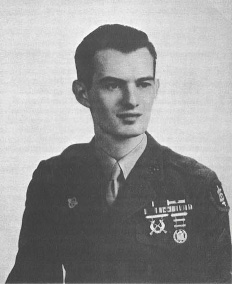
The author in 1945
THIS BOOK IS LARGELY A MARINE'S MEMOIR, NOT A BALANCED HIStory of the war with Japan. Those who want versions of air and naval engagements during the conflict must look elsewhere; descriptions of Douglas MacArthur's campaigns, for example, may be found in American Caesar, my biography of the general.
That is the first breath. The second, which must quickly follow, is that my reminiscences are not chronological. Any attempt to impose structure upon the chaos of personal history, with the intent of attracting and holding the reader, necessarily involves some distortion. It may be as great as a Mercator projection's for instance, Daniel Defoe's Journal of the Plague Year, a riveting account of a disaster which struck when the writer was five years old or as slight as H. L. Mencken's genial caveat that his autobiography was yarning and not always photographically precise, that there are no doubt some stretchers in this book, though mainly it is fact.
So here too. After thirty-five years, any man who suffered a head wound (my medical discharge papers note that, among other things, I had sustained traumatic lesions of the brain) can never be absolutely sure of his memory. But everything I have set down happened, and to the best of my recollection it happened just this way, except that I have changed names to respect the privacy of other men and their families. But I have resorted to some legerdemain in the interests of re-creating, and clarifying the spirit of, the historical past. Here and there I use the pronoun we in its all-inclusive sense, as in We won the war. More specifically, although I enlisted in the Marine Corps shortly after Pearl Harbor, I was ordered back to college until called up. Thus, although I spent seven months on Guadalcanal, I arrived after the Japanese hegira and saw no fighting there. No infantryman fought on all, or even many, of the Pacific islands. Deployment of troops, casualty figures, and tropical diseases laid down impossible odds against that. My own combat experience occurred on Okinawa, where I fought for over two months, during which I was wounded twice, was ordered off the line once, and was ultimately carried off the island and evacuated to Saipan. I have drawn from that bank of experience for flash-forwards in earlier chapters, introducing each episode at a point where it seems fitting. Writing them was extremely difficult. My feelings about the Marine Corps are still highly ambivalent, tinged with sadness and bitterness, yet with the first enchantment lingering. But by mining that tough old ore, and altering the order of those personal events, I have, I believe, been able to present a sequential account of a war which still confuses most Americans.
This, then, was the life I knew, where death sought me, during which I was transformed from a cheeky youth to a troubled man who, for over thirty years, repressed what he could not bear to remember.
Expressing gratitude to those who helped me along the way during this long journey into the past is an occasion for both pleasure and frustration pleasure, because my memories of their kindnesses are still warm, and frustration, because my appreciation can never be adequate. I hope I have omitted no one. It is possible. Jungles are poor places to keep files. If I thus err in omission, I trust I shall be forgiven. Forgiveness is also asked for my failure to identify individuals by their military, diplomatic, civilian, tribal, and ecclesiastical titles. Generals are here, and monsignors, and ambassadors all in different hierarchies, so varied and often so defiant of classification that I have resorted to that weak crutch, the alphabet. I honor each source; I thank each; I am deeply indebted to all; and I believe that they will share my doubt that rank will count for much when we cross that dark river to the far shore where all voyages end and all paths meet.
My Samaritans, then, were: Jonathan F. Abel, Aguedo F. Agbayani, Consul Alberto, C. W. Allison, Norman Anderson, John A. Baker, Itaaka Bamiatoa, Kabataan Barangay, Carmelo Barbero, Susan Bardelosa, Ieuan Batten, Bill Bennett, Homer Bigart, Al Bonney, Baltazar Jerome Bordallo, Madeleine M. Bordallo, Ricardo J. Bordallo, Robert L. Bowen, Edward R. Brady, Margaret A. Brewer, Paul H. Brown, Stanley Brown, Robert Byck, George Cakobau, Oscar Calvo, Carlos S. Camacho, Anthony Charlwood, Donald Chung, Martin Clemens, Andrew W. Coffey, Jeremiah Collins, John P. Condon, Paul Cox, Elfriede Craddock, Jerry Crad-dock, R. Don Crider, Horace Dawson, Beth Day, Judy Day, John deYoung, Rodolfo L. Diaz, Mack R. Douglas, R. E. Duca, Rodolfo Dula, Jim Earl, Florence Fenton, Y. Fujumura, Robert B. Fowler, Jay Gildner, John R. Griffith, Samuel B. Griffith II, John Guise, James Gunther, Robert Debs Heinl, Jr., Ernest S. Hildebrand, Jr., Frank W. Ingraham, Osi Ivaroa, Sy Ivice, Emilie Johnson, Robert Jordan, Timothy Joyner, Bruce Kirkwood, Jackson Koria, Isirfli Korovula, Joiji Kotobalavu, Maura Leavy, Har-land Lee, Theodore Lidz, Chester A. Lipa, Arthur C. Livick, Jr., Ichiro Loitang, Haldon Ray Loomis, Fijito Oshikawa, Howard Mabie, P. D. MacDonald, Luis G. Magbanua, Pio Manoa, P. F. Manueli, Ferdinand Marcos, Imelda Romualdez Marcos, Ann Marshall, Tim Mauldin, Alan Meissner, Mike Mennard, Ross Milloy, Robert Milne, Arnold Milton, Yoshida Mitsui, Ben Moide, George E. Murphy, Satendra Nandan, Beretitaro Neeti, Dave Ngirmidol, Praxiteles C. Nicholson, Homer Noble, Myron Nordquist, Russell E. Olson, Jeremiah J. O'Neil, Noah Onglunge, Hera Owen, Robert Owen, Ted Oxburrow, Katsy Parsons, Lester E. Penney, Harry W. Peterson, Jr., Raymond Pillai, Eugene Ramsey, Asasela Ravuvu, John E. Reece, Garth Rees, Thomas Remengesaw, Carlos Romulo, Tessie Romulo, Pedro C. Sanchez, Frank Santo, Frans Schutzman, Tom Scott, Charles S. Shapiro, Lemuel C. Shepherd, Jr., George Silk, Harry Simes, E. H. Simmons, Gus Smales, Kalista Smau, Hinao Soalablai, Kerrie Somosi, Robert Somosi, Laura M. Souder, Patrick Spread, Taute Takanoi, Jay Taylor, John Terrance, Ian Thompson, Joe Tooker, Jean Trumbull, Robert Trumbull, Fred Turner, Richard Underwood, Mae Verave, Mariano C. Kersosa, Jacob Vouza, Mike Ward, R. J. Wenzei, Roger L. Williams, William Wilson, Adrian P. Winkel, Anne Wray, and Stanton F. Zoglin.
Although this tale is personal, certain books were useful in the telling of it and are recommended to those interested in reading more about the battlefields it cites. These are Rust in Peace, by Bruce Adams (Sydney, 1975); The Pacific: Then and Now,
Next pageFont size:
Interval:
Bookmark:
Similar books «Goodbye, Darkness: A Memoir of the Pacific War»
Look at similar books to Goodbye, Darkness: A Memoir of the Pacific War. We have selected literature similar in name and meaning in the hope of providing readers with more options to find new, interesting, not yet read works.
Discussion, reviews of the book Goodbye, Darkness: A Memoir of the Pacific War and just readers' own opinions. Leave your comments, write what you think about the work, its meaning or the main characters. Specify what exactly you liked and what you didn't like, and why you think so.

